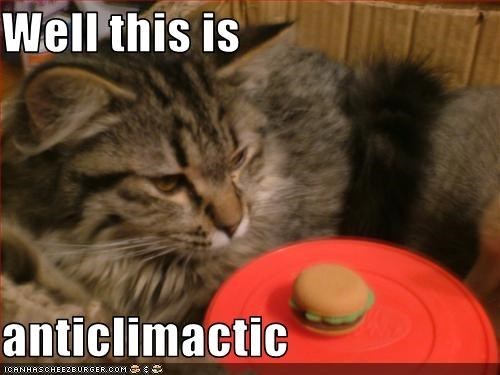Paying off the Conflict
 Unless you're watching an avant garde art film, the main reason you keep following a story is your desire to see how it 'all turns out'. By this, I mean we want the showdown between competing businesses, or the hero and the monster, or to see whether the protagonist can get over their crippling psychological conflict. The scale of this moment varies depending on the tone of the story-- it could be as simple and understated as a character coming to an internal decision, or as dramatic as a battle between spaceships.
Unless you're watching an avant garde art film, the main reason you keep following a story is your desire to see how it 'all turns out'. By this, I mean we want the showdown between competing businesses, or the hero and the monster, or to see whether the protagonist can get over their crippling psychological conflict. The scale of this moment varies depending on the tone of the story-- it could be as simple and understated as a character coming to an internal decision, or as dramatic as a battle between spaceships.And because we are so familiar with story structure on a subconsious level, we get very disappointed when the conflict fails to pay out.
I'm not suggesting that you follow formula. Rather, that you keep track of the building tensions in the story and resolve those main storylines as dramatically as you can within the tone and context of the story. For example, one of the reasons the ending of In the Flesh annoyed me so much (and what showed it up as a blatant example of Bury Your Gays) is that the viewers got robbed of the awesome four-way showdown that had been brewing for most of the series between the hero, his sister, the hero's best friend/love interest, and the love interest's parents. All parties had strong motives, three quarters had guns, one was an established crazypants, and two were shown to be kickass snipers-- a recipe for excitement. But instead of an epic shootout and shouting match, we got an offscreen death and some halfhearted yelling and moping from the main character. Totally disappointing.
The main idea is that the payoff needs to be proportionate to the buildup. The more the conflict escalates in the story, the bigger and more dramatic a resolution the reader expects. And as the author, that's what you need to deliver.
Published on May 24, 2013 02:46
No comments have been added yet.



